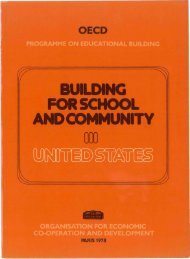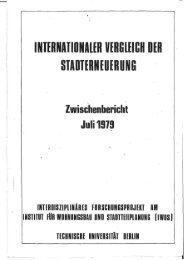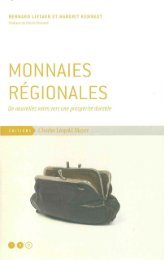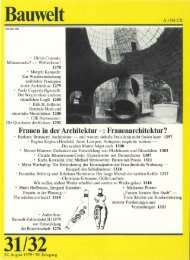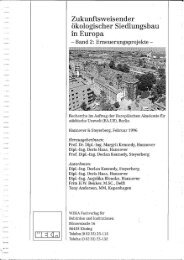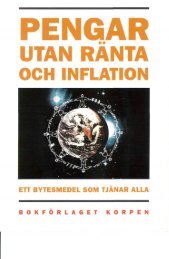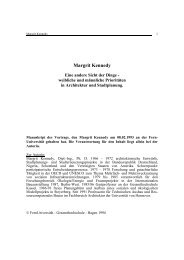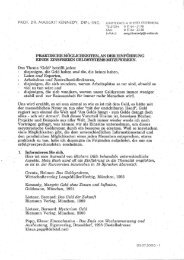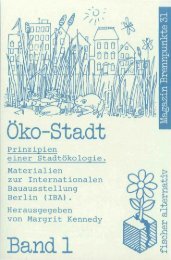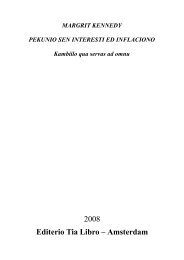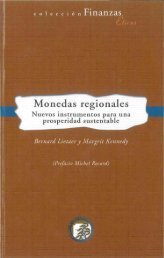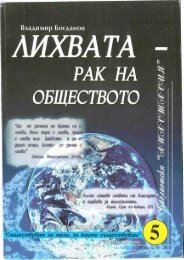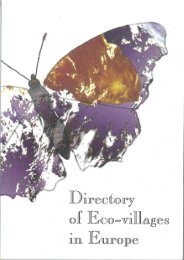Permaculture and the sustainable city - Kennedy Bibliothek
Permaculture and the sustainable city - Kennedy Bibliothek
Permaculture and the sustainable city - Kennedy Bibliothek
Create successful ePaper yourself
Turn your PDF publications into a flip-book with our unique Google optimized e-Paper software.
PERMACULTURE INSTITUTE OF EUROPE<br />
PERMAKULTUR INSTITUT E.V.<br />
If you are like many people, you'd liketo do your pan to reduce <strong>the</strong> human impact<br />
on <strong>the</strong> Earth, <strong>and</strong> <strong>the</strong>re certainly are times when <strong>the</strong> idea of simplifying your life sounds<br />
appealing as well. Yet when it comes right down to it you're still hesitant about whe<strong>the</strong>r<br />
<strong>the</strong>se great ideas would really work for you. You may feel overwhelmed, or you may feel<br />
you have gone as far as you know how. You may be asking yourself questions like:<br />
• Where do I start?<br />
• Which actions are die important ones?<br />
• How do I implement <strong>the</strong>se actions?<br />
• Does what I do actually make a difference?<br />
And through it all, what you would probably really like is relevant personal help<br />
<strong>and</strong> support for <strong>the</strong> process of changing your life so that it can be more "Earth friendly."<br />
An innovative program aimed at doing just that has been created. It's part of<br />
something called <strong>the</strong> Global Action Plan for <strong>the</strong> Earth (GAP), a new non-governmental<br />
organization formed by a team of international activists under <strong>the</strong> leadership of David<br />
Gershon. (David organized <strong>the</strong> First Earth Run in !986 as part of <strong>the</strong> UN International<br />
Year of Peace <strong>and</strong> it became <strong>the</strong> largest world peace event in history. The Earth Run<br />
involved 25 million people <strong>and</strong> 45 heads of state, in 62 countries <strong>and</strong> through <strong>the</strong> media<br />
reached 10% of <strong>the</strong> world's population.)<br />
GAP'S full program isn't scheduled to "go public" until Spring 1991, but it has<br />
been developed to <strong>the</strong> point where pilot programs have begun in several countries. Here's<br />
<strong>the</strong> big picture - it has three major pieces.<br />
First, global environmental goals: To help determine which actions are <strong>the</strong> most<br />
relevant, we assembled <strong>the</strong> most important environmental goals recommended by major<br />
international commissions (such as <strong>the</strong> Brundtl<strong>and</strong> Commission) <strong>and</strong> well-recognized<br />
research groups (such as Worldwatch Institute). We used this material to set quantitative<br />
global environmental goals for <strong>the</strong> year 2000, such as a 20% reduction in global C02<br />
emissions. The goals we prepared became <strong>the</strong> basis for Eanh Day I990's "Agenda for <strong>the</strong><br />
Green Decade."<br />
Next, grassroots action: This second major part of <strong>the</strong> GAP program involves<br />
connecting <strong>the</strong> global goals to relevant actions you <strong>and</strong> I can take in our households,<br />
workplaces <strong>and</strong> communities. Trie starting point for this work is contained in GAP's<br />
Household EcoTeam Program - a six-month program for restoring your household to<br />
environmental balance. GAP is designed to help set-up <strong>and</strong> support EcoTeams all over <strong>the</strong><br />
world.<br />
The final piece in GAP's overall program is feedback <strong>and</strong> communications. The<br />
results of <strong>the</strong> actions taken by all <strong>the</strong> EcoTeams are collected <strong>and</strong> communicated out to <strong>the</strong><br />
media <strong>and</strong> back to each EcoTeam on a monthly basis. That way we can know that our<br />
actions, ra<strong>the</strong>r than just being "a drop in <strong>the</strong> bucket," are actually helping to Jill <strong>the</strong> bucket 1<br />
The feedback <strong>and</strong> exposure will empower fur<strong>the</strong>r action by demonstrating that progress<br />
toward <strong>the</strong> global goals is possible - <strong>and</strong> that it's happening.<br />
THE HOUSEHOLD ECOTEAM PROGRAM<br />
At <strong>the</strong> heart of GAP is <strong>the</strong> Household EcoTeam Program, which is designed to help<br />
transform people's desire to make a difference into effective actions that really;«'// make a<br />
difference.<br />
The program simplifies <strong>the</strong> overload of environmental information, <strong>and</strong> divides it<br />
into six specific action areas - one set of actions to work on each month, over a period of<br />
six months. A small group of friends, family members, neighbors, or <strong>the</strong> like called an<br />
EcoTeam. support each o<strong>the</strong>r in putting <strong>the</strong>se actions into practice. An easy-to-use<br />
F,-fTfiim W'.M-JVKII- PFWI|,-I Mephv-sten Guidance as vou <strong>and</strong> vour EcoTeam work<br />
THE GLOBAL ACTION PLAN<br />
Joining a "Household EcoTeam " will give you support for gelling your life in balance with <strong>the</strong> Earth<br />
Fig. 2: Permacuiture — a Global Action Plan. (Source: <strong>Permaculture</strong> Institute of Europe).<br />
within walking distance of a transit stop.<br />
• Illustrate <strong>and</strong> celebrate <strong>the</strong> community's ideals about<br />
llvablllty by underwriting <strong>the</strong> construction of exemplary<br />
<strong>and</strong> unique buildings <strong>and</strong> public spaces. Develop a guide<br />
to Instances in which planning for livability has succeeded.<br />
• Raise citizen awareness of elements, techniques <strong>and</strong><br />
Importance of <strong>sustainable</strong> practices, using a variety of<br />
media In order to reach a broad cross-section of <strong>the</strong> population<br />
— as in <strong>the</strong> case of <strong>the</strong> Global Action Plan (fig.<br />
2). Include such points as <strong>the</strong> benefits of moderate-density<br />
living, <strong>the</strong> relationship between <strong>city</strong> <strong>and</strong> country, <strong>and</strong><br />
<strong>the</strong> need for open space <strong>and</strong> wildlife habitat within urban<br />
areas.<br />
Long-term wisions for municipal action<br />
Municipalities could:<br />
• Emphasize a long-term, regional perspective in <strong>city</strong><br />
planning. Develop information about potential effects on<br />
<strong>the</strong> entire region, not just on <strong>the</strong> area within a <strong>city</strong>'s<br />
jurisdiction. Base It on <strong>the</strong> concept of bio-regions. Use<br />
that Information In planning decisions. Examine <strong>the</strong><br />
cumulative impact of development schemes, not just <strong>the</strong><br />
incremental change resulting from each one.<br />
• Identify "sacred places" — ranging from parks to<br />
historic buildings to cafes <strong>and</strong> teenager hangouts —<br />
that may not be removed or disturbed.<br />
• Use <strong>city</strong> money to buy, move, demolish or refurbish<br />
buildings that are located In ecologically sensitive or<br />
through <strong>the</strong> monthly action areas to:<br />
• Improve Home Energy Efficiency<br />
• Improve Home Water Efficiency<br />
• Reduce Your Garbage<br />
• Improve Transportation Efficiency<br />
• Be an Eea-Wise Consumer<br />
• Empower O<strong>the</strong>rs through Household.<br />
Workplace, <strong>and</strong> Community Action<br />
For each of <strong>the</strong> first five months, <strong>the</strong> workbook guides you through an assessment<br />
of <strong>the</strong> current status of your household relative to each action area. Then, based on <strong>the</strong><br />
results of your assessment, you'll choose from a list of suggested actions to bring your<br />
household closer to a <strong>sustainable</strong> balance with <strong>the</strong> environment. Finally, each month you'll<br />
implement <strong>the</strong> actions you select <strong>and</strong> report <strong>the</strong> results back to your EcoTeam.<br />
The sixth month is for celebrating your EcoTeam's accomplishments - <strong>and</strong> for<br />
looking ahead to exp<strong>and</strong> your effectiveness. Guidelines are provided to help organize new<br />
Household EcoTeams, or to begin working to bring your community <strong>and</strong> workplace into<br />
environmental balance. To fur<strong>the</strong>r support this, GAP has developed a leadership training<br />
that helps individuals empower o<strong>the</strong>rs to take effective action, it balances inner<br />
development with <strong>the</strong> outer skills needed to accelerate transformative change.<br />
THE GAP-EARTH DAY CONNECTION<br />
GAP is off to a fast start: it already has country coordinators in :<br />
Canada,India, The Ne<strong>the</strong>rl<strong>and</strong>s, Norway, Sweden,. United<br />
Kingdom, <strong>and</strong>'<strong>the</strong>:.United States . . GAPs leadership is truly international in<br />
representation, <strong>and</strong> it has formed an alliance with Earth Day International, which is<br />
encouraging its worldwide network to participate in <strong>the</strong> EcoTeam Program.<br />
The EcoTeam Program was designed to help meet Earth Day's "Agenda for <strong>the</strong><br />
Green Decade." Key to <strong>the</strong> Agenda are 15 quantifiable goals for protecting <strong>the</strong> health of <strong>the</strong><br />
planet- These goals address needs to preserve <strong>the</strong> climate <strong>and</strong> atmosphere, preserve<br />
biological diversity, reduce waste, use water wisely, <strong>and</strong> stabilize human population. They<br />
provide a basis for <strong>the</strong> design of specific actions, as well as a means of measuring<br />
progress. The Agenda itself also serves as a vehicle for alignment among environmental<br />
groups. As GAPs program develops it will begin to measure progress made by EcoTeams<br />
<strong>and</strong> <strong>the</strong> various environmental groups in relationship to <strong>the</strong> global goals <strong>and</strong> report <strong>the</strong><br />
results each Earth Day.<br />
The goals are large ones - r. leering <strong>the</strong> scale of global environmental problems.<br />
No doubt some will argue that <strong>the</strong>y are too ambitious, o<strong>the</strong>rs that <strong>the</strong>y do not go far<br />
enough. GAP welcomes that debate <strong>and</strong> encourages that <strong>the</strong> goals be adapted to local<br />
needs. At <strong>the</strong> same time, we must begin taking action now. If we wait for full consensus<br />
on <strong>the</strong> goals, <strong>the</strong> continuing damage to global ecosystems will likely be irreversible.<br />
Why start with households? Because while <strong>the</strong> goals may seem beyond <strong>the</strong> reach<br />
of individuals, <strong>the</strong>y can only be met by empowering collective, individual actions. As<br />
Time magazine in <strong>the</strong>ir "Planet of <strong>the</strong> Year" issue states, "No attempt to protect <strong>the</strong><br />
environment will be successful in <strong>the</strong> long run unless ordinary people are willing to adjust<br />
<strong>the</strong>ir lifestyles." GAPs EcoTeam program is <strong>the</strong> needed next step in helping <strong>the</strong> ordinary<br />
person make <strong>the</strong> lifestyle changes so urgently needed if we are to heal our Earth.<br />
How can you get involved? \) Order <strong>the</strong> EcoTeam Workbook <strong>and</strong> form your own<br />
EcoTeam. 2) Encourage organizations to which you belong to participate. 3) Use your<br />
networks to encourage o<strong>the</strong>rs to form EcoTeams. A'\ Heirs build <strong>the</strong> program financially.<br />
valuable areas — e.g. along waterfronts, streams or<br />
hilltops — <strong>and</strong> are near <strong>the</strong> end of <strong>the</strong>ir useful lives.<br />
• Adopt "Statutes of Responsibility" that delineate <strong>the</strong><br />
obligations of off Icials <strong>and</strong> agencies to preserve <strong>the</strong> health<br />
of <strong>the</strong> <strong>city</strong> <strong>and</strong> Its inhabitants <strong>and</strong> to make It as selfreliant<br />
as possible, <strong>and</strong> that require developers to bear<br />
costs generated by <strong>the</strong>ir development <strong>and</strong> currently paid<br />
by <strong>the</strong> public. These range from water <strong>and</strong> sewer use<br />
to air pollution <strong>and</strong> encroachment on open space.<br />
All <strong>the</strong>se proposals can be advanced through appropriate<br />
zoning policies <strong>and</strong> should be considered in<br />
light of <strong>the</strong>ir impact on <strong>the</strong> health of <strong>the</strong> entire bio-region<br />
<strong>and</strong> on planet earth.<br />
Note<br />
In developing this course outline <strong>and</strong> exp<strong>and</strong>ing on it during<br />
<strong>the</strong> three-day seminar on <strong>Permaculture</strong> <strong>and</strong> <strong>the</strong> Sustainable City<br />
held at <strong>the</strong> Narwal, Wassenaar, <strong>the</strong> Ne<strong>the</strong>rl<strong>and</strong>s, <strong>the</strong> author<br />
was inspired heavily by three books:<br />
1. Bill Mollison (1988), <strong>Permaculture</strong>: A Designer's Manual (Tagari,<br />
Tyalgum, Australia).<br />
2. Peter Berg, Beryl Magilavy <strong>and</strong> Seth Zuckermann (1990), A<br />
Green City Program for <strong>the</strong> San Francisco Bay Area <strong>and</strong><br />
Beyond (Planet Drum Books, P.O. Box 31251, San Francisco,<br />
CA 94131, USA).<br />
3. David Gershon <strong>and</strong> Robert Gilman (1991), Household Ecoteam<br />
Workbook: A Six-Month Program to Bring Your Household<br />
into Environmental Balance, a Program of Global Action Plan<br />
for <strong>the</strong> Earth (GAP), 57a, Krumville Road, Olivebridge, New<br />
York 12461, USA (Telephone: int + 1 914 657 -8081, Fax<br />
- 8044).<br />
Ekistlcs 348, May/June 1991<br />
349, July/August 1991 215



